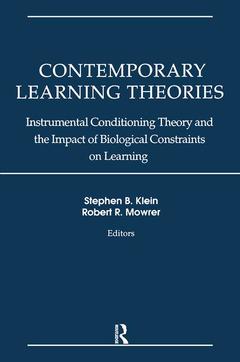Contemporary Learning Theories Volume II: Instrumental Conditioning Theory and the Impact of Biological Constraints on Learning
Coordonnateurs : Klein Stephen B., Mowrer Robert R.

This unique two-volume set provides detailed coverage of contemporary learning theory. Uniting leading experts in modern behavioral theory, these texts give students a complete view of the field. Volume I details the complexities of Pavlovian conditioning and describes the current status of traditional learning theories. Volume II discusses several important facets of instrumental conditioning and presents comprehensive coverage of the role of inheritance on learning.
A strong and complete base of knowledge concerning learning theories, these volumes are ideal reference sources for advanced students and professionals in experimental psychology, learning and learning theory, and comparative physiology.
Volume I: Contents: R.R. Mowrer, S.B. Klein, Traditional Learning Theory and the Transition to Contemporary Learning Theory. Part I:Theories of Pavlovian Conditioning.P.J. Durlach, Learning and Performance in Pavlovian Conditioning: Are Failures of Contiguity Failures of Learning or Performance? R.R. Miller, L.D. Matzel, Contingency and Relative Associative Strength. A.G. Baker, P. Mercier, Attention, Retrospective Processing and Cognitive Representations. G. Hall, R. Honey, Perceptual and Associative Learning. A.R. Wagner, S.E. Brandon, Evolution of a Structured Connectionist Model of Pavlovian Conditioning (AESOP). A. Tomie, W. Brooks, Sign-Tracking: The Search for Reward. Part II:Current Status of Traditional Learning Theory.D.J. Levis, The Case for a Return to a Two-Factor Theory of Avoidance: The Failure of Non-Fear Interpretations. A. Dickinson, The Expectancy Theory of Animal Conditioning. Volume II: Contents: R.R. Mowrer, S.B. Klein. Part I:Introduction: A Contrast Between Traditional and Contemporary Learning Theory.Part II:Theories of Instrumental Conditioning.J. Allison, The Nature of Reinforcement. R.M. Church, Theories of Timing Behavior. S.F. Maier, Learned Helplessness: Event Co-Variation and Cognitive Changes. F. Vaccarino, B.B. Schiff, S.E. Glickman, A Biological View of Reinforcement. Part III:Biological Constraints in Learning.V.M. LoLordo, A. Droungas, Selective Associations and Adaptive Specializations: Food Aversion and Phobias. J. Garcia, L. Brett, K. Rusiniak, Limits of Darwinian Conditioning. A.L. Riley, C.L. Wetherington, Schedule-Induced Polydipsia: Is the Rat a Small Furry Human? W. Timberlake, G.A. Lucas, Behavior Systems and Learning: From Misbehavior to General Principles.
Date de parution : 08-1989
15.2x22.9 cm
Date de parution : 01-2019
15.2x22.9 cm
Thème de Contemporary Learning Theories :
Mots-clés :
Instrumental Conditioning; text book; Mesolimbic DA; associative learning; Locomotor Activity; Taste Aversions; Pavlovian conditioning; Behavior System Approach; behavioral theory; NA DA; contemporary; Lever Press; psychology; Odor Aversion; present; Inescapable Shock; learning theory; Response Deprivation; learning; Mesolimbic DA Neuron; knowledge; Differential Conditioning; experimental psychology; Conditioned Place Preference; experiment; Spaced Feedings; evolution; Selective Association; attention; Pellet Delivery; inheritance; Species Typical Behaviors; Almond Odor; Schedule Constraint; Mesolimbic DA System; Saccharin Consumption; Learned Helplessness Theory; Mesolimbic System; Instrumental Response; Water Deprivation



